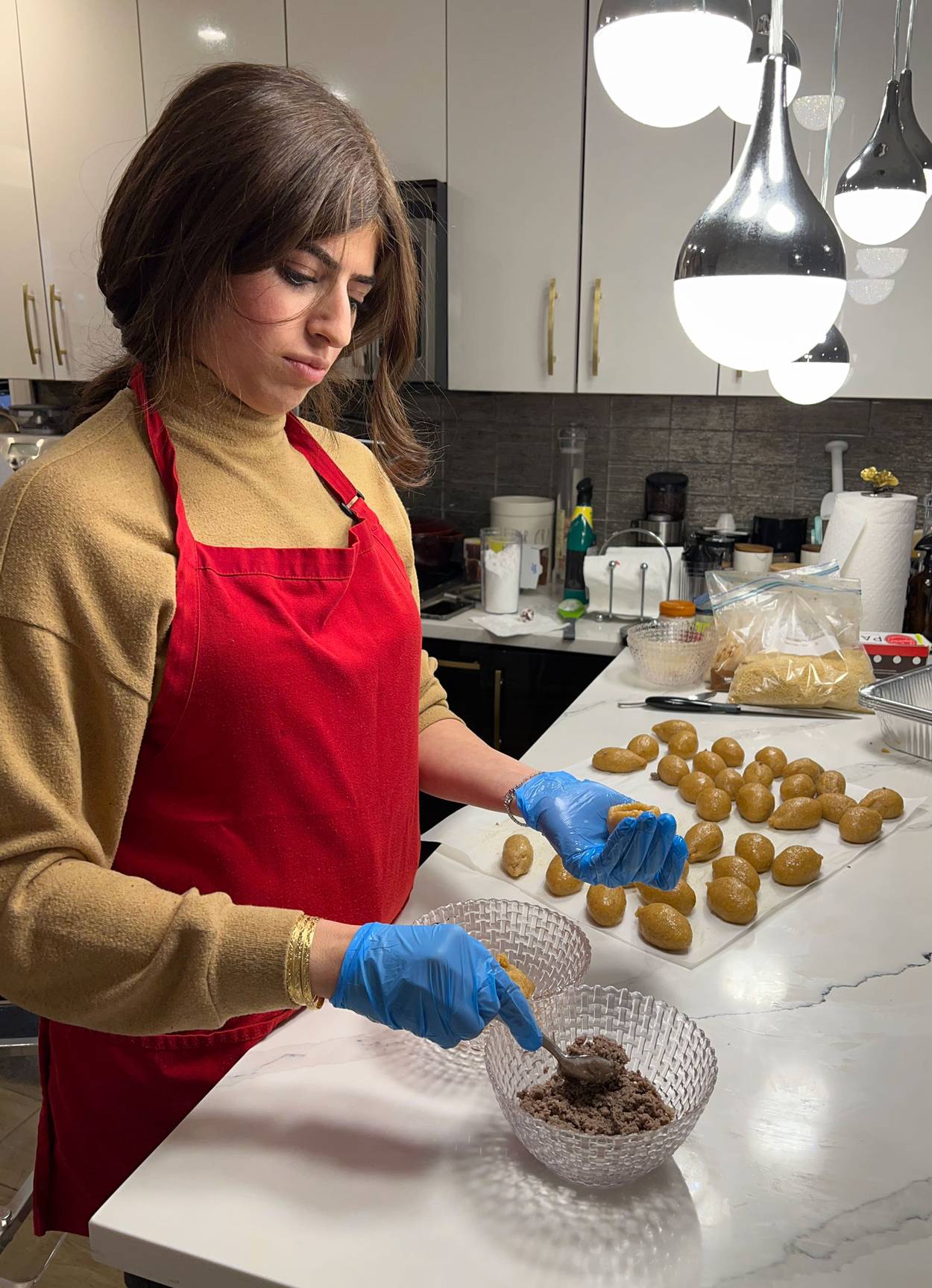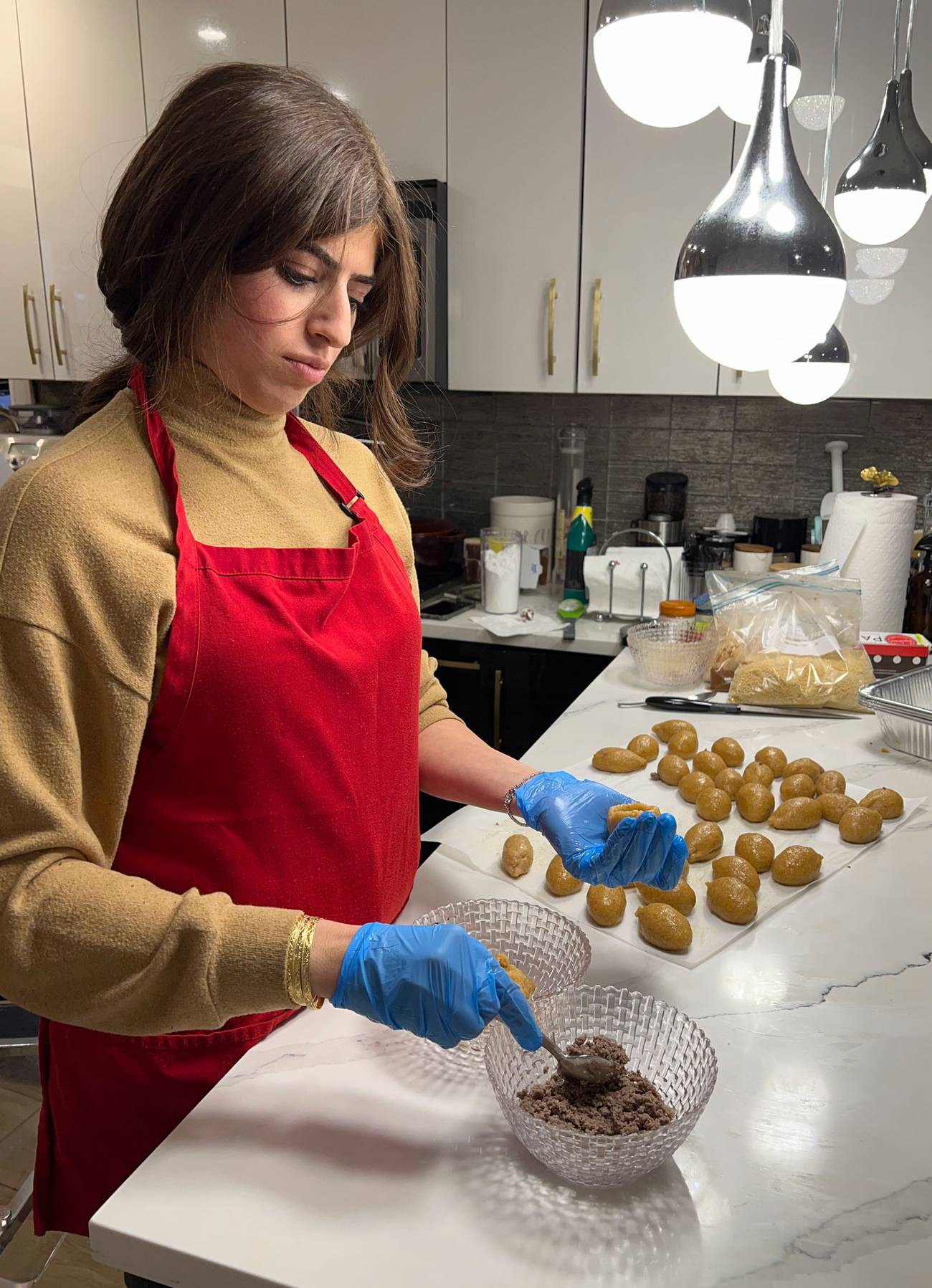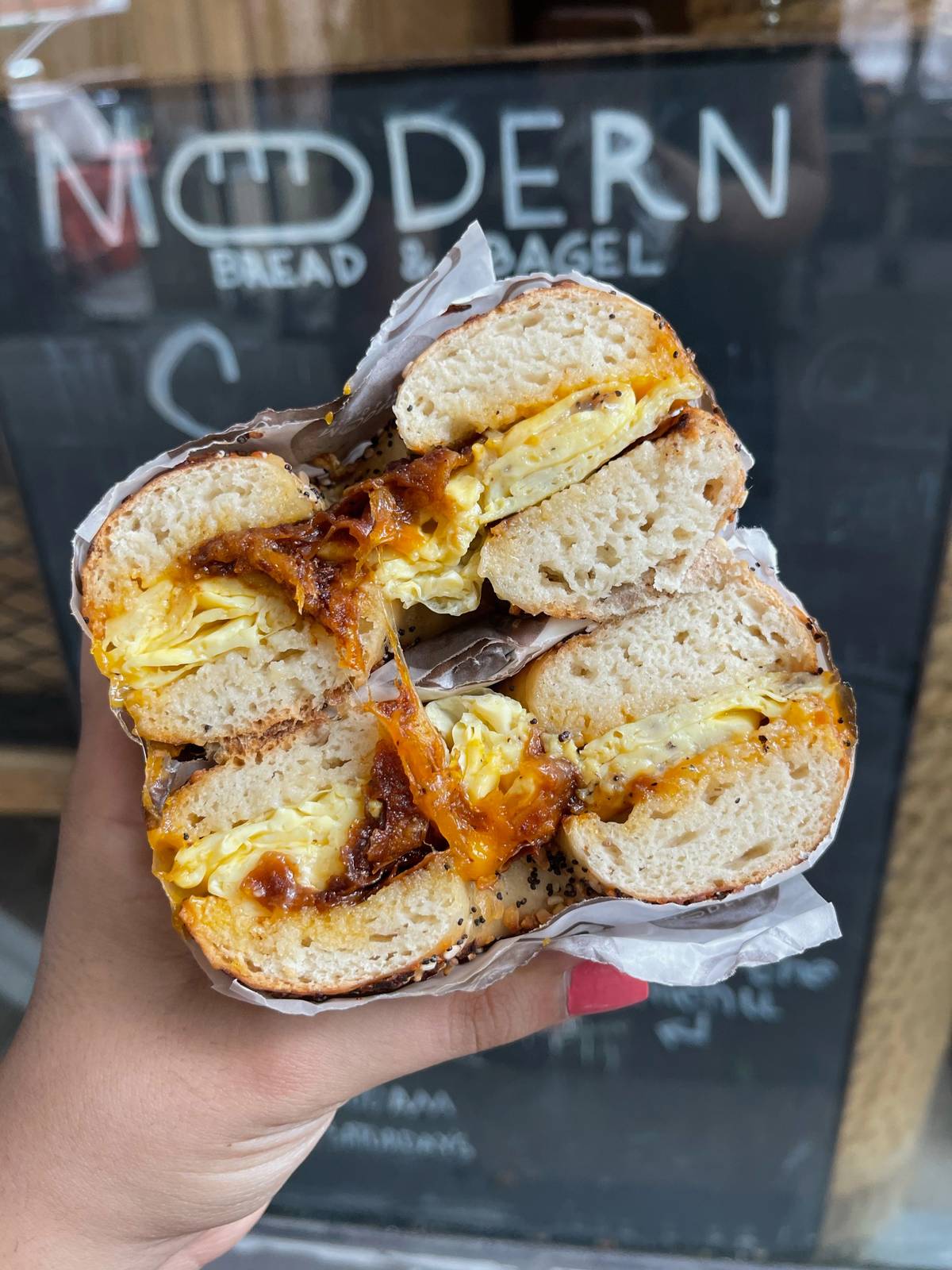Bagels, Kibbeh, and Sambusak—Hold the Gluten
Helping Jews with celiac disease enjoy traditional foods filled with cultural meaning




My relationship with Judaism has always revolved around food. While my family didn’t attend synagogue much, our holiday meals were our most meaningful expressions of Judaism. Friday night Shabbat dinners were sacred. I’m half Sephardic and half Ashkenazi, so our table would be filled with foods from both halves of my identity: laham bijeen and kugel, kibbeh and rugelach. Tearing into a fresh challah on Friday night after the blessings, and waking up to the smell of fresh bagels on Saturday mornings are some of my fondest memories.
So what happens when you’re not allowed to eat the foods you cherish most?
I was nearly 30 when I found out that I’m one of approximately 1.8 million people in the U.S. who have celiac disease, an immune disorder that’s triggered by eating gluten. It’s one thing to not be able to grab a slice of pizza on the corner, or a bagel at the deli. But to not be able to eat the foods that are so much a part of your religion and culture? I was devastated, and determined to find a way.
I went on a hunt, determined to not be left out of my culture’s traditions, and I found Esther Anzaroot, a local chef who would recreate the Syrian mezze (appetizers) I so missed—without gluten. I was hosting my family for Shabbat, and was elated to finally be able to offer the same foods I grew up eating. And it didn’t taste or feel different at all.
Anzaroot’s parents were from Aleppo, Syria, and immigrated to Virginia. After her dad died, her mother moved the family to the Syrian community in Brooklyn. While she was managing her sister’s clothing company, her hobby was cooking.
Six or seven years ago, her son brought home his girlfriend—and announced that she was gluten-free. “Everything about our culture is food,” said Anzaroot. “It’s so important to us. I had to find a way for her to eat our food. So I started experimenting … I had no idea it would turn into a business.”
Anzaroot was able to have her Ashkenazi future daughter-in-law get to know her family’s Syrian culture through gluten-free versions of kibbeh, laham bijeen, sambusak, and more. Then people in her Brooklyn community heard about what she was doing, and the orders started pouring in. She sold her delicacies to local families, supermarkets, and restaurants.
“People would stop making mezze for their family, because they felt bad leaving out those who couldn’t eat gluten,” Anzaroot said. “We helped them bring it back. It’s so important for people to be able to enjoy their culture, and their ethnic foods. Everyone wants to feel that they’re like everyone else, and that they belong, and we’re able to help them feel that way.”
Recently, I spent a day cooking and eating with Anzaroot. We spoke more about how she recreates recipes, while we cooked kibbeh—one of my favorite dishes from childhood, which I thought I’d never be able to eat again. While the dish is traditionally made from bulgur wheat, Anzaroot spent months experimenting with different textures before settling on creating her own rice flour blend for the casing. As she was teaching me how to pinch and turn the shell, she told me how her business started when she was sourcing recipes for her son’s girlfriend: Her daughter went to stay with a friend in Miami who had a family recipe for sambusak that left out gluten. Esther adapted the recipe, and attributes that moment to her believing she could recreate other traditional Syrian recipes to be gluten-free. “I owe it to Elayna,” she said. I gasped. It turns out Elayna is my first cousin, and the recipe she sees as the origin of her business belongs to my Aunt Pnina in Israel. So here I was standing in a stranger’s kitchen, learning my own family’s recipes.
I watched Anzaroot’s hands as she quickly and effortlessly formed perfectly shaped kibbeh. “It takes years of practice,” she said as she glanced at my oddly shaped creations. Together we heated the oil as we dunked the kibbeh, waiting for them to turn the perfect shade of gold, signaling that they were ready. I could hardly wait to taste them, as I bit into a way-too-hot kibbeh for the first time in years. “These taste just like I remember,” I said, as I continued to eat two more.
After years of selling her homemade gluten-free mezze, Anzaroot took the next step and enrolled in the kosher culinary center in Brooklyn to refine her craft. It was there she met Lily Mishan Nissim, who would become her partner.
They were working out of her house, then needed a commercial kitchen so they rented space at the kosher culinary center where they met. Orders for Anzaroot’s creations started coming in from Chicago and Baltimore, far from the Syrian community in Brooklyn she was used to serving. But there was a limit to how far her reach could be, because not everyone is familiar with Syrian mezze.
“That’s when I decided to pivot my business and give people the autonomy to make gluten-free products their own way,” she said, noting that they’re planning to launch their business, Gluten Free Easy, in early 2022. They used to sell ready-to-serve gluten-free mezze; now they’ll be introducing a line of frozen, raw, gluten-free doughs that will allow customers to create their own dishes. “One of my products will be gluten-free puff pastry dough. I’m hoping it inspires people of all cultures to make the ethnic food that they love and miss most. For some, that might be an egg roll, a napoleon, or a boureka.”
Dani Secemski, the owner of Glatt Express in Teaneck, New Jersey, bought many of Anzaroot’s gluten-free creations, and is eagerly waiting for her new products to launch. “I saw Esther’s products and reached out to her because they were super-unique and we had a need for it. Every week we’d sell out with people buying 10 pieces at a time. The demand is crazy!”
I couldn’t believe I finally found a bagel that tasted like the real thing.
“I joke that I’m the first person families call when they come back from the doctor after getting diagnosed with celiac,” said Anzaroot. “I’m so happy I can help them. People say ‘Esther, if it wasn’t for you, we wouldn’t have eaten any of our traditional foods.’”
Anzaroot and Mishan aren’t the only ones recreating Jewish food to be gluten-free.
On a quest to find a good gluten free bagel, I came upon Modern Bread and Bagel on the Upper West Side of Manhattan. I read about the opening, and waited in line for over an hour in 2019 while I was seven months pregnant. Until then, I had never had a gluten-free bagel that actually tasted good. I remember sitting on a bench outside the restaurant, devouring my bagel, lox, and cream cheese. I couldn’t believe I finally found a bagel that tasted like the real thing.

Orly Gottesman created Modern Bread and Bagel after her husband, the son of bagel makers, was diagnosed with celiac disease just a few years into their relationship, and she saw a void in the gluten-free offerings in New York City. ”At the time, I was not a baker and wasn’t interested in pursuing it as a career,” she said. “But we were living in Paris due to Josh’s job, and I didn’t have a working visa so I took French baking classes, and very quickly learned I had a knack for baking.”
She knew this was something she was passionate about. So she ended up applying to Le Cordon Bleu culinary school to learn more. It was during her time in culinary school that she learned you can’t use the same flour blends for gluten-free cakes and breads, so she created Blends By Orly, a line of gluten-free flour blends.
“Eventually we moved back to the United States, and we saw a bagel shop for rent in Manhattan,” she said. “I was selling my flour blends, but no one could really execute what I could do the way I could do it. We knew we had a killer bagel recipe, the right gluten-free flour, and knew that what we wanted didn’t exist.”
In 2019, Gottesman and her husband opened their very own gluten-free restaurant where they serve bagels, grilled cheese, freshly made breads, and more items that people like me have just learned to live without.
“We wouldn’t be who we are without our bagels,” said Gottesman. “For so many people, a big part of their childhoods were bagels on a Sunday morning. They miss that experience so when they try our bagels and are finally able to have that back, it brings them to tears.”
Apparently I wasn’t the only one to obsess over their perfect gluten-free bagel. Modern Bread and Bagel has become the exclusive gluten-free bagel provider to Black Seed Bagels, another bagel shop with several locations in New York City.
“Black Seed Bagels has become synonymous with great bagels, so it was important that we partnered with a gluten-free bakery that not only cared when it came to providing NYC with truly gluten-free products but also didn’t compromise on quality,” said Dianna Daoheung, Black Seed Bagel’s culinary director and partner. They chose Modern Bread and Bagels to be their provider for gluten-free bagels and now, she said, they have trouble keeping up with the demand. “To this day I am still blown away at how closely it came to a traditional bagel.”
Modern Bread and Bagel is slated to open another location in Chelsea in early 2022, followed by a Los Angeles location by the spring.
Beyond finding success in business, Gottesman believes her restaurant and products provide meaning and purpose to the community she serves. Her business has rave reviews, and tons of loyal customers who wouldn’t be able to participate in the joys of eating otherwise. Ranit Librach, whose 8-year-old daughter has celiac disease, told me: “My daughter used to love challah and looked forward to eating it at every family holiday. We struggled to find a tasty gluten-free challah until we tried Modern Bread and Bagel. Now, we buy one and bring it to every family holiday and my daughter is truly able to feel a part of our traditions and celebrations.”
Jamie Betesh Carter is a researcher, writer, and mother living in Brooklyn.